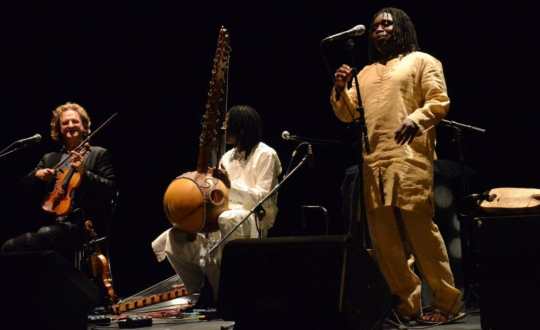|
Just now and then, a record comes along in which everything about it seems to perfectly embody the broader intentions underlying the work. Lumba is a case in point. Tamala are a Belgium-based trio featuring vocalist Mola Sylla and kora-player Bao Sissoko, both from Senegal, plus Belgian violinist Wouter Vandenabeele and this is their second album. In the sleeve notes (which are given in Dutch, English and French) we are told that in an unfair world where hypocrisy reigns, "Lumba" represents change, a wish to "look at the world with an open mind, a world in which everyone has the right to exist in his or her own way." Without wishing to stretch the point too much, I couldn't help thinking as I listened that the music they produce together is a telling illustration of that aspirational ideal. The songs (all but one composed by Bao Sissoko) have a predominantly African base yet the generous interplay between Sylla, Sissoko and Vandenabeele - who brings a different perspective to the mix, allows the music to transcend geographic cultural definitions to produce something new and really quite wonderful.
The album grabs your attention from the outset with "Yanoul." � A single-note pulse established by Sylla on the riti (a Senegalese fiddle) is then offset by a plucked riff from Vandenabeele's violin over which Sylla begins to sing, harmonizing by guest vocalist Sylvie Nawasadio, with Sissoko proceeding to join in on kora. From the start a fine balance is struck between tight arrangement and spontaneity, creating a real sense of the musicians playing in the moment, directly responding to one another. Mola Sylla's vocals have an endearing quality possessing both warmth and authority, while Wouter Vandenabeele's violin playing is endlessly inventive, always sensitive to what else is going on and at times quite sublime. I admit to being a sucker for the sound of the kora and Bao Sissoko never disappoints, while at the same time not allowing us to have too much of a good thing.

|
|
There are several guest appearances, each adding an extra different ingredient without ever seeming intrusive. On "Picce Mi" and "Hallelujah," Olivier Vander Bauwede contributes some harmonica, bringing a change of texture to the instrumentation. "Picce Mi" tells of a bird looking down on the world and realising that wealth is not fairly distributed amongst those who provide for everyone. It asks why people forget to share that wealth.

|
|
The CD booklet contains player credits for each track as well as the translated lyrics and color photos of the band. All the songs are sung in either Wolof or Soussou, both languages widely spoken in Senegal, but "Tule Tuul" is sung partly in Estonian by another guest vocalist, Mari Kalkun, who also accompanies herself on the kannel (Estonian box zither) alongside the violin and kora. Based on a traditional Estonian song the track's gentle lilt fits seamlessly into the pervading mood of the album which, while not lacking variety, certainly benefits overall from a sense of understatement, cultivated in the transparency of Christine Verschorren's fine production. There is one purely instrumental track on Lumba, a duet featuring Sissoko and Vandenabeele, the delightful "Fan Soto."

|
|
"Tolof Tolof" also begins sparsely with a gentle kalimba rhythm, some wispy violin improvisation and plaintive singing from Sylla, but here things build in intensity as Sissoko's kora makes its presence felt and Vandenabeele's wanderings become focused into an almost frantic series of repeated semiquavers until suddenly everything stops. The song deplores the practice of children being forced by their Koranic teachers to beg on the street, endangering their lives.
Lumba is released on the Muziekpublique label, part of a non-profit organization supporting and promoting artists in and around Brussels and they too deserve some credit for the work they do and indeed for putting this fine album out. For me it's certainly one of the top musical finds of the year.
More about the trio and Muziekpublique
Photo: Mirko Popovitch
Further reading:
Bará
Dawda Jobarteh
Mari Kalkun
Ambrozijn
|
